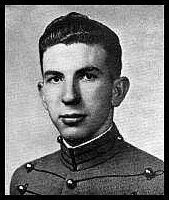 |
MEMORIAL ARTICLE
Published Assembly Sep '82
Frank Adair Doyle NO. 15771 CLASS OF 1946 Died
5 November 1950 on a combat mission in North Korea, aged 25 years.
|
"Throughout the years the Armed Forces has tendered awards
in honor of their fallen countrymen, The Secretary of the Air
Force has requested me to transmit to you the Purple Heart, which
has been awarded posthumously to your son, Captain Frank A Doyle,
who sacrificed his life in the defense of his country . . ."
(Letter to Mrs. Merle Doyle from Lieutenant General Kuter, Deputy
Chief of Staff for Personnel, 9 January 1952.)
Frank Adair Doyle ended his life serving his country only
four short years after graduation, but those were full, exciting
and productive years, with more zest for living jammed into them
than most people experience in a lifetime.
Frank was born in Chicago, Illinois, 31 May 1925, and his
earliest ambition had always been to enter West Point. He moved
to Atkinson, Nebraska, where he attended early grade school and
then on to Phoenix Arizona, where he attended North Kenilworth
High School. During his senior year he was selected as a Reserve
Officer Training Corps Cadet Major, which was his first of many
military achievements. Frank received his West Point appointment
while still in high school and decided that attending a special
preparatory school in Long Beach, California would enhance his
chances of passing the West Point exams. Accordingly he left
high school before the end of his senior year, determined to
complete the prep school, and to enter West Point. In fact he
did not receive his diploma from high school until his plebe
year.
"Frank came through the usual trials and tribulations
of cadet life with consistent cheerfulness and characteristic
good nature...." (1946 HOWITZER)
After graduation his first duty assignment was fighter transition
at Williams Field, Arizona. He was fortunate to return to his
home state and to many friends for his first Air Force assignment.
Frank always accepted the good assignments with the bad and in
no way tried to influence his superiors for any special favors.
His political pull was zero and he firmly believed that outstanding
performance and dedication to duty would, in the long run, furnish
its just rewards.
Next, after fighter transition training in propeller aircraft,
Frank was assigned to the only jet fighter group in the entire
United States Air Force at March Field, California. Since this
was such a sought after assignment by many World War II experienced
fighter pilots, Frank along with a few other classmates was indeed
fortunate.
With his usual persistence and attention to detail, Frank
gradually acquired jet experience and had enough single engine
jet time by October 1947 to volunteer for a special "Cold
Weather Test" operation in Fairbanks,
Alaska. Although only a second lieutenant and a "permanent
wing man," Frank saw this as another opportunity to gain
valuable experience.
Returning to the Zone of Interior in spring of 1948, Frank
was next transferred to occupation duty in Misawa, Japan. He
was still a jet fighter pilot and as additional duty became Assistant
Squadron Engineering Officer. This duty involved many test flights
following major aircraft maintenance. The peacetime duty was
rather uneventful until June 1950 when the Korean War broke out.
Frank started flying combat in early August 1950, and it became
obvious that he possessed the essential attributes of a combat
leader. He was soon recognized for his superior performance with
a combat spot promotion to captain, well below the zone and ahead
of many more experienced pilots in the same unit. Frank accepted
his good fortune and continued his outstanding performance in
his first real chance at actual combat. In those days Frank left
one with the impression that he was at least doing what he was
trained for. He had enough time in the aircraft. He knew the
terrain and weather, he knew his squadron mates and their limitations,
and he knew himself. If ever anyone was prepared for combat—
Frank Doyle was.
Yet, on 5 November l95O, Frank was field testing a new and
large external fuel tank on an actual combat mission. So typical
of his approach to problems, Frank felt that since he was the
Squadron Engineering Officer and the most experienced test pilot
available, he should be the one to test the new tank. He never
returned. From many reports and pieces of information gathered
later, it was learned that while on a rocket pass, Frank's aircraft
entered an uncontrollable spin and he was unable to recover in
time. He crashed in enemy territory, well beyond the range of
Search and Rescue units. None of the subsequent flights over
the area could detect any sign of survivors.
Frank is survived by his mother, Merle Doyle, and his sister,
Dorothy Ann Sargent, both of Phoenix, Arizona.
Nothing we can do or say will in any sense repair the loss of
Frank Adair Doyle. He has gone in honor and in the worthy company
of the Long Gray Line.
—J.W.J. '46
|